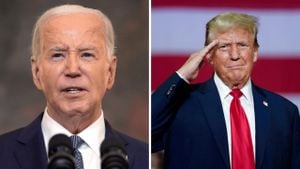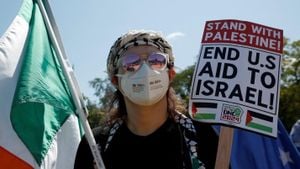Hurricane Rafael hit western Cuba as a major Category 3 storm last week, causing extensive blackouts across the island. The storm, which struck on Wednesday, resulted in power outages affecting millions, with the blackout lasting nearly two days. This disruption came only weeks after Hurricane Oscar left eight people dead and triggered another widespread blackout, making the situation particularly dire.
Following Rafael's impact, protests erupted in several areas, including Havana, as citizens expressed their frustration over the government’s inability to maintain power supply and address the worsening economic crisis. Street protests are especially rare within the communist-run nation, underscoring the severity of public discontent.
The Cuban government responded swiftly, with authorities announcing the arrest of several individuals for their involvement in these demonstrations. Specific figures on those detained have not been disclosed, but reports indicate arrests occurred mainly in Havana and lesser-known provinces such as Mayabeque and Ciego de Ávila. They are facing charges related to public disorder and property damage.
The prosecutor's office stated, "Those arrested were implicated for their acts of aggression against officials and causing public disturbances." A local human rights organization, Justicia 11J, pointed out more than ten arrests took place merely on the outskirts of Havana, emphasizing the crackdown on peaceful protesters. According to the organization, the individuals detained were participating non-violently, which they actively documented.
Power outages have plagued Cuba for months, characterized by intermittent electricity supply due to aging infrastructure and limited resources. The island, which boasts around 10 million residents, relies heavily on aging coal-fired power plants, many of which are inactive or under maintenance. To cope, the government has also leased floating plants from Turkish companies and deployed diesel generators. Still, acute fuel shortages have compounded the problem significantly.
President Miguel Díaz-Canel reacted to the rising unrest by asserting the government would not tolerate actions disrupting public order. His stance aligns with past governmental reactions to dissent, as seen during widespread protests across the island on July 11, 2021. Those protests resulted from pervasive food shortages, prompting thousands to chant for change. Approximately 1,500 were arrested, with many still imprisoned today.
The electrical issues affecting the nation starkly mirror Cuba's economic struggles, once again raising questions about the regime's efficiency and ability to uphold its citizens’ welfare. Amid this turmoil, the UN General Assembly reiterated its long-standing appeal for the United States to lift its six-decade trade embargo on the island, thought to exacerbate the economic crisis significantly.
The hurricane's aftermath is part of Cuba's larger narrative of enduring economic hardship. The country has been grappling with soaring inflation and scarcity of basic goods since the Soviet Union's fall, its previously lauded economic partner. The crises have placed tremendous strain on the population, leading more Cubans to voice their discontent, whether through social media or on the streets.
Many citizens are increasingly vocal about their frustrations with the government’s handling of electricity shortages and the economic downturn. This has raised concerns among officials about potential unrest similar to the massive protests witnessed just over two years prior, where the need for basic necessities took center stage.
Although some areas of Havana have reportedly regained power, significant outages still plague much of the capital and the nearby province of Artemisa, leaving residents anxious about the reliability of their local utilities.
The situation remains fluid as Cuba continues to manage both the effects of recent hurricanes and increasing dissatisfaction among its people. While the government attempts to restore power and control any potential dissent, the undercurrents of public unrest highlight longstanding issues troubling the nation.
With its electricity grid struggling under the weight of the economic crisis, the recent protests signal more than just opposition to power outages; they reflect years of accumulated frustration and desperation among the Cuban people.



